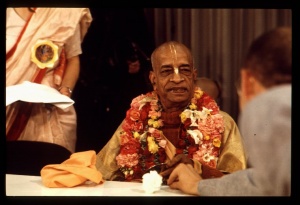SB 8.24.2-3

A.C. Bhaktivedanta Swami Prabhupada
TEXTS 2-3
yad-artham adadhād rūpaṁ
mātsyaṁ loka-jugupsitam
tamaḥ-prakṛti-durmarṣaṁ
karma-grasta iveśvaraḥ
etan no bhagavan sarvaṁ
yathāvad vaktum arhasi
uttamaśloka-caritaṁ
sarva-loka-sukhāvaham
SYNONYMS
yat-artham—for what purpose; adadhāt—accepted; rūpam—form; mātsyam—of a fish; loka-jugupsitam—which is certainly not very favorable in this world; tamaḥ—in the mode of ignorance; prakṛti—such behavior; durmarṣam—which is certainly very painful and condemned; karma-grastaḥ—one who is under the laws of karma; iva—like; īśvaraḥ—the Supreme Personality of Godhead; etat—all these facts; naḥ—unto us; bhagavan—O most powerful sage; sarvam—everything; yathāvat—properly; vaktum arhasi—kindly describe; uttamaśloka-caritam—the pastimes of the Supreme Personality of Godhead; sarva-loka-sukha-āvaham—by hearing of which everyone becomes happy.
TRANSLATION
What was the purpose for which the Supreme Personality of Godhead accepted the abominable form of a fish, exactly as an ordinary living being accepts different forms under the laws of karma? The form of a fish is certainly condemned and full of terrible pain. O my lord, what was the purpose of this incarnation? Kindly explain this to us, for hearing about the pastimes of the Lord is auspicious for everyone.
PURPORT
Parīkṣit Mahārāja's question to Śukadeva Gosvāmī was based on this principle stated by the Lord Himself in Bhagavad-gītā (BG 4.7):
- yadā yadā hi dharmasya
- glānir bhavati bhārata
- abhyutthānam adharmasya
- tadātmānaṁ sṛjāmy aham
"Whenever and wherever there is a decline in religious practice, O descendant of Bharata, and a predominant rise of irreligion—at that time I descend Myself." The Lord appears in each incarnation to save the world from irreligious principles and especially to protect His devotees (paritrāṇāya sādhūnām (BG 4.8)). Vāmanadeva, for example, appeared to save the devotee Bali Mahārāja. Similarly, when the Supreme Personality of Godhead accepted the abominable form of a fish, He must have done so to favor some devotee. Parīkṣit Mahārāja was eager to know about the devotee for whom the Supreme Lord accepted this form.